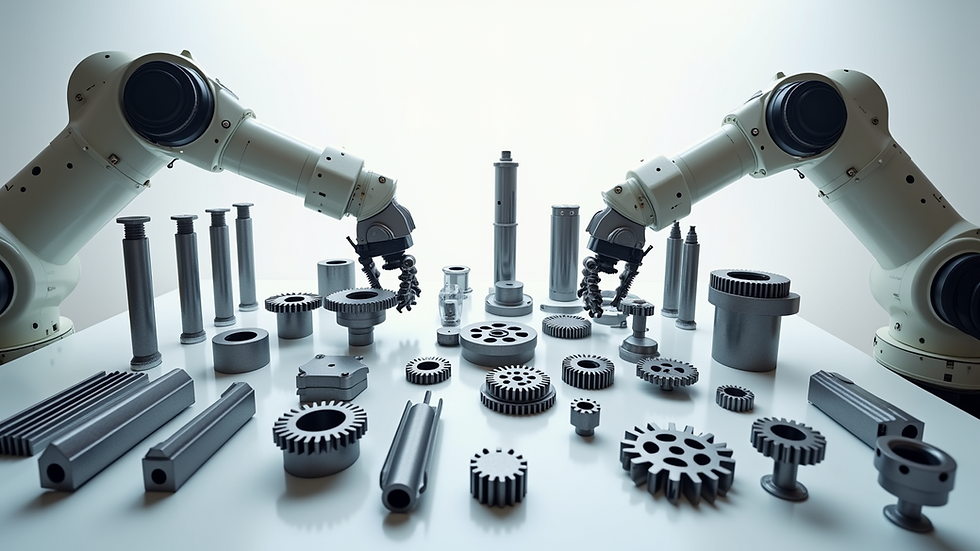How AI is Revolutionizing Industrial Operations
- 4lenspartnerships
- Jul 7
- 4 min read
The integration of artificial intelligence (AI) into industrial operations is transforming the landscape of manufacturing and production. From enhancing efficiency to minimizing costs, AI technologies are proving to be game-changers. As industries strive for greater productivity and innovation, the adoption of AI is becoming increasingly critical. This blog post explores the various ways AI is revolutionizing industrial operations, highlighting specific examples and actionable recommendations.
AI in Factories
To understand how AI is revolutionizing industrial operations, it’s crucial to first grasp its application in factories. AI encompasses advanced algorithms and machine learning techniques that enable machines to learn from data. In the context of factories, this means optimizing production processes, predictive maintenance, and even enhancing supply chain logistics.
For instance, General Electric's use of AI in their manufacturing plants exemplifies this transformation. They implemented AI-driven predictive maintenance, which drastically reduced machinery downtime. Traditional manufacturing often involved reactive maintenance, leading to costly delays and repairs. By shifting to a predictive model, facilities can anticipate equipment failures before they occur, saving both time and money.

Enhancing Efficiency with AI-powered Automation
AI is streamlining operations through automation, allowing manufacturers to operate more efficiently. Robotic process automation (RPA) combined with AI can handle repetitive tasks that once required human interventions. This not only speeds up production but also reduces the likelihood of human error.
One notable example is the automotive industry, which has widely adopted AI-powered robotics. Ford, for instance, utilizes AI-driven robots in assembly lines to efficiently assemble parts and perform quality inspections. These robots work alongside human workers, enhancing productivity without replacing the workforce. According to a study by McKinsey, organizations implementing automation can enhance productivity by up to 30%.

Predictive Analytics: Forecasting Needs and Trends
One of the most powerful applications of AI in industrial operations is predictive analytics. By analyzing historical data, AI can forecast trends and optimize inventory management. This capability allows factories to make informed decisions about production schedules and resource allocation.
Companies like Siemens have successfully integrated predictive analytics into their operations. By analyzing real-time data and market trends, Siemens can forecast demand for their products. This not only reduces waste but also ensures that production meets market needs. In fact, businesses leveraging predictive analytics have reported up to a 10% increase in inventory turnover rates, demonstrating significant operational efficiency.

Quality Control and Assurance
AI's role in quality control is another area where industrial operations are witnessing significant improvements. With AI-powered computer vision technologies, manufacturers can monitor product quality in real-time. These systems can detect defects that human inspectors might overlook, ensuring that only the highest quality products reach the market.
For example, Nestle has implemented AI-based quality inspections in their food processing plants. Using AI, they can analyze images of products on the assembly line to ensure they meet quality standards. This not only reduces waste but also enhances consumer trust in their products.
Employee Empowerment Through AI Integration
While AI is often perceived as a threat to jobs, in reality, it serves as an empowering tool for employees. By automating mundane tasks, workers can focus on more meaningful and creative aspects of their jobs. This transition fosters a more engaged workforce and enhances job satisfaction.
Companies that have embraced AI-driven technologies often report higher employee morale and productivity. For instance, Cisco’s Smart Manufacturing program allows employees to interact with AI systems to enhance their workflows, providing them with tools that amplify their abilities. Workers are then positioned as overseers of these technologies rather than mere operators.
The Future of Industrial AI
Looking ahead, the potential for AI in industrial operations seems limitless. With continuous advancements in machine learning and data analytics, industries will increasingly rely on AI to solve complex challenges. The integration of IoT (Internet of Things) with AI will further transform operations, creating smarter and more responsive manufacturing environments.
As industries prepare for this future, it is crucial for organizations to establish a robust data strategy. Proper data collection and analysis will empower AI systems, enabling them to deliver meaningful insights. Furthermore, investing in training programs for employees will ensure that the workforce is prepared to collaborate with emerging technologies.
Final Thoughts
AI's influence on industrial operations is profound and far-reaching. From enhancing efficiency and predictive maintenance to improving quality control and empowering employees, AI is reshaping how factories operate. As this technology continues to evolve, industrial sectors must embrace these changes to stay competitive. By implementing AI-driven solutions and fostering a culture of innovation, organizations can thrive in the rapidly changing industrial landscape.
To explore more about how artificial intelligence in factories is revolutionizing operations, stay informed and keep innovating. The adoption of AI is not merely an option but a necessity for future success in the industrial arena.




Comments